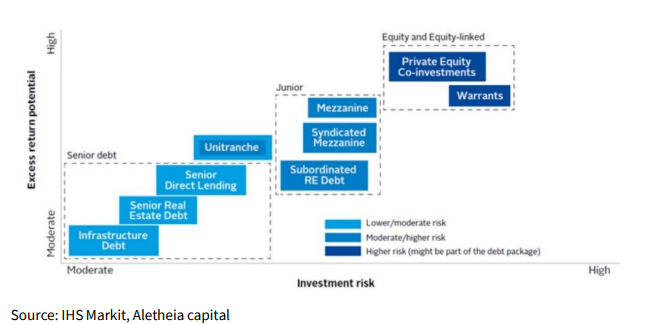5 Key Actions To Secure A Role In The Booming Private Credit Sector

Table of Contents
Network Strategically within the Private Credit Industry
Building a strong network is crucial for landing a job in the private credit sector. It's not just about who you know; it's about building meaningful relationships with key players.
Attend Industry Events and Conferences
Networking at relevant conferences is invaluable. These events provide opportunities to meet recruiters, hiring managers, and other professionals in the private credit industry.
- Specific Conferences: SuperReturn, Private Debt Investor conferences, industry-specific events hosted by associations like the Loan Syndications and Trading Association (LSTA).
- Benefits: Building relationships, gaining insights into current market trends, learning about unadvertised job openings, and discovering potential mentors.
- Active Participation: Don't just attend; actively participate. Ask insightful questions, engage in discussions, and exchange business cards. Follow up with new contacts within 24-48 hours.
Leverage LinkedIn for Professional Networking
LinkedIn is a powerful tool for private credit sector networking. Use it strategically to connect with professionals and showcase your expertise.
- Profile Optimization: Optimize your LinkedIn profile with keywords relevant to private credit roles, such as "credit underwriting," "debt financing," "portfolio management," and "distressed debt." Highlight your skills and experience in a compelling way.
- Relevant Groups: Join relevant LinkedIn groups focused on private credit, private equity, or alternative investments. Engage in discussions, share insightful articles, and participate actively.
- Connecting with Recruiters: Identify and connect with recruiters specializing in the private credit sector. Regularly engage with their content and reach out directly when you see relevant opportunities.
Develop In-Demand Skills for Private Credit Roles
Private credit firms seek candidates with strong analytical skills, financial modeling expertise, and relevant experience.
Master Financial Modeling and Analysis
Proficiency in financial modeling is essential for many private credit roles. This involves using software and techniques to analyze financial data and make informed investment decisions.
- Essential Software Skills: Microsoft Excel (advanced level), Bloomberg Terminal, Argus, and other relevant financial software.
- Modeling Techniques: DCF analysis, LBO modeling, credit analysis, and valuation techniques.
- Understanding Financial Statements: Demonstrate a deep understanding of interpreting balance sheets, income statements, and cash flow statements.
Gain Experience in Relevant Fields
Experience in related fields like investment banking, accounting, or asset management can significantly enhance your candidacy. Transferable skills from these areas are highly valued in the private credit sector.
- Relevant Internships: Seek internships at private equity firms, investment banks, or accounting firms that work with private credit transactions.
- Entry-Level Positions: Consider entry-level roles in areas such as financial analysis or credit risk management.
- Volunteer Opportunities: Volunteer work with non-profit organizations providing financial services can demonstrate your commitment and skills.
Tailor Your Resume and Cover Letter for Private Credit Positions
Generic applications rarely succeed in a competitive market like private credit. Your resume and cover letter must be precisely targeted to each opportunity.
Highlight Relevant Experience and Skills
Customize your resume and cover letter to match the specific requirements of each job description. Use keywords from the job posting and quantify your accomplishments whenever possible.
- Keywords and Phrases: "Credit underwriting," "debt financing," "portfolio management," "due diligence," "loan structuring," "distressed debt," "restructuring."
- Quantifiable Results: Instead of saying "Improved efficiency," say "Improved efficiency by 15% through process optimization."
Showcase Your Understanding of the Private Credit Market
Demonstrating knowledge of the private credit market and the specific firm you're applying to significantly strengthens your application.
- Research Specific Firms: Thoroughly research the firms you're applying to, understanding their investment strategies, portfolio companies, and recent transactions.
- Showcase Knowledge: Reference specific deals or strategies in your cover letter, showing your genuine interest and understanding of the firm's activities.
Prepare for the Private Credit Interview Process
The private credit interview process is rigorous. Thorough preparation is key to success.
Practice Behavioral and Technical Interview Questions
Practice answering common behavioral and technical interview questions specific to private credit. Use the STAR method (Situation, Task, Action, Result) to structure your responses.
- Behavioral Questions: "Tell me about a time you failed," "Describe a situation where you had to work under pressure," "How do you handle conflict?"
- Technical Questions: "Explain your understanding of leverage," "What are the key risks associated with private credit investing?" "Walk me through a DCF analysis."
Research the Firm and Interviewers
Before each interview, thoroughly research the firm and the interviewers. Understanding their background and investment strategies will demonstrate your genuine interest.
- Research Resources: Company websites, LinkedIn, industry news, and deal databases.
- Demonstrate Interest: Ask thoughtful questions that show you've done your homework and are genuinely interested in the firm and its activities.
Follow Up After the Interview
Following up appropriately demonstrates professionalism and persistence.
Send a Thank You Note
Send a personalized thank-you note within 24 hours of each interview, referencing specific aspects of the conversation.
- Personalization: Mention something specific you discussed, reiterating your interest in the role and the firm.
- Professional Communication: Maintain a professional and courteous tone throughout the process.
Follow Up on the Application Status
Politely follow up on the application status after a reasonable timeframe (e.g., a week after the interview, or two weeks after submitting your application).
- Appropriate Timelines: Avoid excessive follow-ups. Be patient, but persistent.
- Maintain Contact: Keep recruiters informed of any updates in your job search.
Conclusion
Securing a role in the dynamic private credit sector requires a strategic and proactive approach. By actively implementing these five key actions—strategic networking, skill development, resume/cover letter optimization, interview preparation, and diligent follow-up—you can significantly increase your chances of landing a rewarding career in the booming private credit sector. Start building your network and developing your skills today!

Featured Posts
-
 Nyt Strands Hints And Answers For Tuesday March 4 Game 366
May 10, 2025
Nyt Strands Hints And Answers For Tuesday March 4 Game 366
May 10, 2025 -
 Trumps Choice For Surgeon General Examining The Maha Movements Influence
May 10, 2025
Trumps Choice For Surgeon General Examining The Maha Movements Influence
May 10, 2025 -
 El Bolso Hereu De Dakota Johnson Minimalista Y Practico
May 10, 2025
El Bolso Hereu De Dakota Johnson Minimalista Y Practico
May 10, 2025 -
 Nhs Trust Bosss Cooperation With Nottingham Attack Investigation
May 10, 2025
Nhs Trust Bosss Cooperation With Nottingham Attack Investigation
May 10, 2025 -
 U S And China Seek Trade De Escalation In Crucial Talks
May 10, 2025
U S And China Seek Trade De Escalation In Crucial Talks
May 10, 2025
